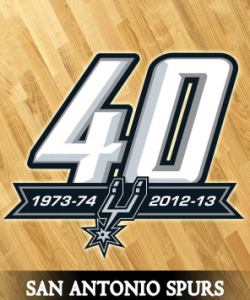 The San Antonio Spurs have a keen eye for talent. They do a lot of things right and a lot of those principles are applicable to how we in corporate America recruit and retain employees and run our organizations.
The San Antonio Spurs have a keen eye for talent. They do a lot of things right and a lot of those principles are applicable to how we in corporate America recruit and retain employees and run our organizations.
Starting with recruiting, the Spurs have a keen eye for talent. They do not chase super-flashy, high-priced free agents. Rather, their approach has been to travel the globe and find players who fly under the radar with superb talent and who are overlooked, like Tony Parker, Manu Ginobili, and Gary Neal, and then to develop those players into superstars. When they do sign a player, that player has to fit the profile of the organization, which typically means possession of a team-first mentality, selfless in actions, good person, and willing to buy into the system.
Looking at retention and starting at the top, their coach Gregg Popovich has been the head coach of the Spurs for 17 years and with him several of his assistant coaches have long tenure. This tenure of coaches has been vital to the success of the team, as tenured leaders come with knowledge, credibility, trust, and a strategic outlook.
In looking at the player roster, tenure has also been paramount with the team. The Big Three — Tim Duncan, Manu Ginobili, and Tony Parker — have played together since the 2001-02 season and have shared in three NBA titles and 11 straight playoff appearances. No three players have played together longer on any current NBA roster. Their experience, maturity, professionalism, and leadership have been the key drivers in bringing other players into the organization where they are taught the system, professionalism, and how to be successful. All three players — Duncan, Ginobili, and Parker — have had the chance to test the free agent market and go to teams in bigger markets. Yet all stayed with the organization due to their relationships with the coaches, the executives, the owner, and the fans. The organization has made it so great for them that they remain loyal to the team.
Forbes recently named the San Antonio Spurs North America’s Best Run Professional Sports Franchise. This is not by accident. The Spurs are a world-class organization and all the credit should go to the management and the players. Specifically looking at the players, they are not full of flash and selfishness. While other teams have superstars who show up in the media everyday due to controversy or trouble, one will be hard pressed to ever find the smallest blip in the media on a Spurs player.
The players’ “team first” mentality has also been a key driver in their long term success. No other team in the NBA could have a superstar like Tim Duncan lead the team for so many years, then suddenly take a back seat to the new game plan and watch another player be elevated into his spot. Most importantly, the organization has created a culture of buying into the team’s system. Magic Johnson recently said it best: “If you turned on the TV in the middle of a Spurs game, they could be up by 100 or down by 100 and you would never know it because they play the exact same way in either scenario.”
In 2006 while living in Florida, I packed all my things and moved to San Antonio, simply to be closer to the Spurs organization. I am not a bandwagon fan in any respect as I have loved the Spurs ever since they drafted Navy frontcourt man David Robinson in 1989. As I sat and watched the Spurs sweep the Memphis Grizzlies in the Western Conference Finals — I couldn’t help but to be inspired by the continuous success the Spurs have had over the last couple of decades. The San Antonio Spurs, according to ESPN, became the first NBA team to win 50 games in a season over 14 consecutive years and have won four NBA championships since the 1998-1999 season. Forbes recently named the Spurs North America’s Best Run Professional Sports Franchise. No other team in any professional sport has had consistent success like the San Antonio Spurs over the past two decades.
Take a lesson from the greatest sports franchise in America and see if you can create a team, a department, or even a company where you recruit not only the best, but those who fit your culture and have that team-first mentality — then develop them. Create a retention program where you can identify and keep your key leaders and team members in order to create an environment of knowledge, credibility, trust, and strategy.
Many say they wish to build a world class organization — so do it and build a team that acts with class and professionalism and that puts the team first and who buys into the management and leadership system. You may not win an NBA title, but you could grow your company, department, etc. to unparalleled success.